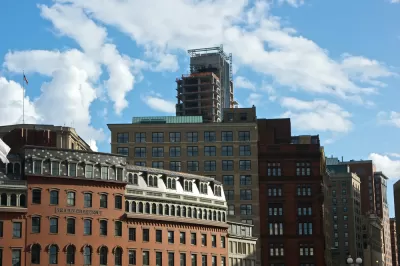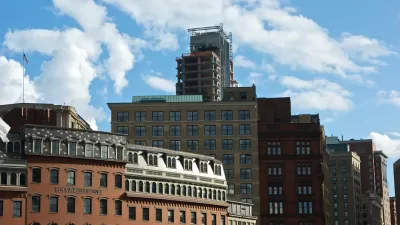The Boston Globe casts doubt on the idea that large amounts of new housing in Boston will be able to reduce already high housing prices in the city.

Evan Horowitz argues against a "build, baby, build" agenda as the solution to the city of Boston's high costs of housing.
Such a strategy, also sometimes called YIMBY, for "Yes In My Backyard," has its limits, according to Horowitz. "New construction doesn’t just mean more options for people who are already here. It means more people moving in. So at the end of all its building, Boston could end up denser yet just as expensive."
Horowitz begins the argument by acknowledging that the city of Boston is one of the slowest-building cities in the United States, with multiple obstacles to a pro-development agenda.
But that doesn't mean that Horowitz accepts that Boston's reluctance to build new housing in large numbers is what's making the city's real estate market more expensive. To make that point, he calls on analysis of rising housing costs in cities around the country—some of the cities with the fastest rising prices are also fast-building cities. "Some construction-friendly cities — like Dallas and Raleigh, N.C. — have seen fairly substantial price increases, comparable to Boston," writes Horowitz. "Meanwhile, the cities with the most restrained cost growth are Chicago and Pittsburgh, which haven’t been doing much building at all."
Finally, the article concludes with the question of whether Boston should build more or not. In the end, Horowitz does support a more pro-development regulatory environment—but not for the reason of lowering housing prices in the city.
FULL STORY: Why more housing won’t make Boston much cheaper

Planetizen Federal Action Tracker
A weekly monitor of how Trump’s orders and actions are impacting planners and planning in America.

San Francisco's School District Spent $105M To Build Affordable Housing for Teachers — And That's Just the Beginning
SFUSD joins a growing list of school districts using their land holdings to address housing affordability challenges faced by their own employees.

The Tiny, Adorable $7,000 Car Turning Japan Onto EVs
The single seat Mibot charges from a regular plug as quickly as an iPad, and is about half the price of an average EV.

Trump Approves Futuristic Automated Texas-Mexico Cargo Corridor
The project could remove tens of thousands of commercial trucks from roadways.

Austin's First Single Stair Apartment Building is Officially Underway
Eliminating the requirement for two staircases in multi-story residential buildings lets developers use smaller lots and more flexible designs to create denser housing.

Atlanta Bus System Redesign Will Nearly Triple Access
MARTA's Next Gen Bus Network will retool over 100 bus routes, expand frequent service.
Urban Design for Planners 1: Software Tools
This six-course series explores essential urban design concepts using open source software and equips planners with the tools they need to participate fully in the urban design process.
Planning for Universal Design
Learn the tools for implementing Universal Design in planning regulations.
Smith Gee Studio
City of Charlotte
City of Camden Redevelopment Agency
City of Astoria
Transportation Research & Education Center (TREC) at Portland State University
City of Camden Redevelopment Agency
Municipality of Princeton (NJ)





























